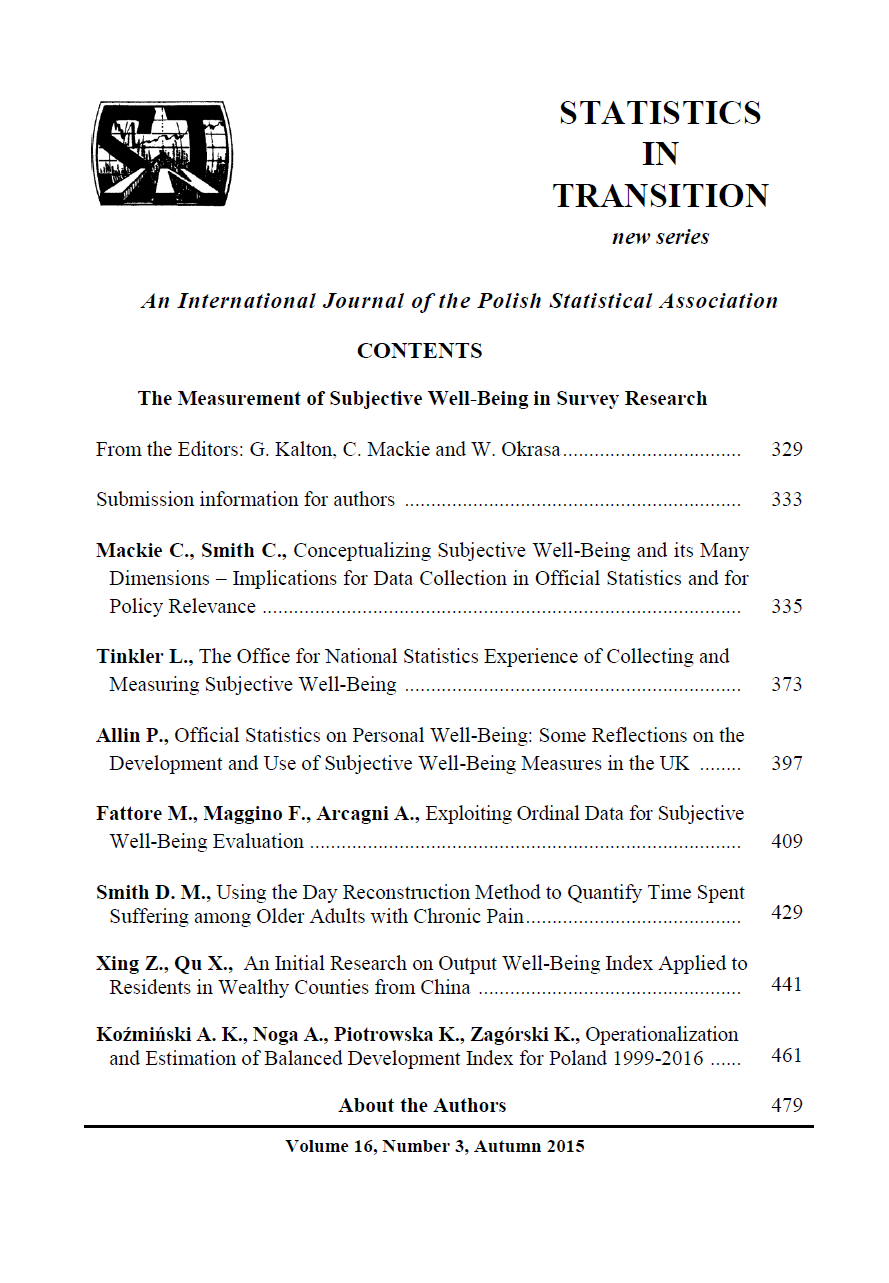ARTICLE
ABSTRACT
Sampling from three wealthy counties in Shandong province (n = 855), this research examined the characteristics of an output well-being index, and the index shows good internal consistency reliability and ideal construct validity. It could be used as an instrument to evaluate the quality of life of Chinese citizens. The index was applied to an analysis of the quality of life of the residents from three wealthy counties. It shows that the level of the quality of life of the rural residents is higher than that of the urban residents, but the level of some indicators is imbalanced, and the levels of subjective and objective indicators are consistent. These characteristics of the well-being index of the rural residents from the wealthy counties are closely related with the level of the local economy and social development. It is advised that the output well-being index could be used to evaluate the degree of citizen’s need that was met and the degree of human being’s all-over development that was realized. It could also be used as an important policy instrument for the policy makers’ good governance.
KEYWORDS
well-being index, output index, quality of life.
REFERENCES
BUETTNER, T., EBERTZ, A., (2009). Quality of life in the regions: results for German Counties. The Annals of Regional Science, 43, 89–112.
BOELHOUWER, J., (2010). Wellbeing in the Netherlands: The SCP life situation index since 1974. Den Haag: Social Cultural Plan bureau.
CAMPBELL,A.,CONVERSE, P. E., RODGERS, W. L., (1976). The Quality of American Life: Perceptions, Evaluations, and Satisfactions. New York: Ussell Sage Foundation.
DIENER, E., (1994). Assessing subjective well-being: progress and opportunities. Social Indicators Research, 31, 103–157.
DIENER, E., SANDVIK, E., PAVOT, W., GALLAGHER, D., (1991). Response artifacts in the measurement of subjective well-being. Social Indicators Research, 24, 35–56.
DIENER, E., FUJITA, F., (1995). Resources, personal strivings, and subjective well-being: anomothetic and idiographic analysis. Journal of Personality and Social Psychology, 68, 926–935.
DEATON, A., (2008). Income, health, and well-being around the world: evidence from the Gallup World Poll. The Journal of Economic Perspectives, 22, 53–72.
GRAHAM, C., FELTON, A., (2006). Inequality and happiness: insights from Latin America. Journal of Economic Inequality, 4, 107–122.
HAGERTY, M., (2000). Social comparisons of income in one’s community: evidence from national surveys of income and happiness. Journal of Personality and Social Psychology, 78, 764–771.
HUANG, L., XING, Z., (2005). An initial research on the wellbeing index applied to citizens in China. Chinese Journal of Behavioral Medical Science, 5,464–465.
KASSER, T., RYAN, R. M., (1994). A dark side of the American dream: correlates of financial success as a central life aspiration. Journal of Personality and Social Psychology, 65, 410–422.
KUBISZEWSKI, I., COSTANZA, R., FRANCO, C., LAWN, P., TALBERTH, J., JACKSON, T., AYLMER, C., (2013). Beyond GDP: Measuring and Achieving Global Genuine Progress. Ecological Economics, 93, 66.
KUSAGO, T., (2007). Rethinking of economic growth and life satisfaction on Post-Wwii Japan - A fresh approach. Social Indicators Research, 81, 79–102.
MAGGINO, F., (2006). Perception and evaluation of the quality of life in Florence, Italy. Community Quality of Life Indicators, Best Cases II,75–126.
MAGGINO, F., NUVOLATI, G., (2011). Introduction. Social Indicators Research, 102, 1.
MAGGINO, F., SCHIFINI D’ANDREA, S., (2003). Different scales for different survey methods: validation in measuring the quality of university life. Advances in Quality of life Theory and Research, 20, 233–256.
MAGGINO, F., NUVOLATI, G., (2012). Quality of life in Italy (Research and Reflections). Social Indicators Research Series, 48, 7–103.
MAX-NEEF, M., (1995). Economic growth and quality of life: a threshold hypothesis. Ecological Economics, 15, 115–118.
MORAWETZ, D., ATIA, E., BIN-NUN, G., FELOUS, L.,GARIPLERDEN, Y., HARRIS, E., SOUSTIEL, S., TOMBROS, G., ZARFATY, Y., (1977). Income distribution and self- rated happiness: some empirical evidence. The Economic Journal, 87, 511–522.
NOLL, H. H., (2002). Towards a European system of social indicators: theoretical framework and system architecture. Social Indicators Research, 58, 51–52.
OECD, (2006). Alternative Measures of well-being. Economic Policy Reforms: Going for Growth, 129–142.
OSHIO, T., KOBAYASH, M., (2011). Area-level income inequality and happiness: evidence from Japan. Journal of Happiness Studies, 12,633–649.
PAVOT, W., DIENER, E., COLVIN, C. R., SANDVIK, E., (1991). Further validation of the satisfaction with Life scale: Evidence for the cross-method convergence of well-being Measures. Journal of Personality Assessment, 57, 149–161.
ROJAS, M., (2011). The measurement of economic performance and social progress report and quality of life: moving forward. Social Indicators Research, 102, 169–180.
SEIDLTIZ, L., DIENER, E., (1993). Memory for positive versus negative life events: theories for the differences between happy and unhappy persons. Journal of Personality and Social Psychology, 64, 654–664.
SEN, A., K. (1993). Capability and Well-Being, in the Quality of Life, ed. Martha Nussbaum and Amartya Sen. Oxford: Clarendon Press.
SUH, E., DIENER, E., FUJITA, F., (1996). Events and subjective well-being: only recent events matter. Journal of Personality and Social Psychology, 70, 1091–1102.
WANG, P., (2011). The impact of income inequality on subjective well-being: evidence from Chinese General Social Survey data. Chinese Journal of Population Science, 3, 93–112.
VEENHOVEN, R., (1984). Conditions of happiness. Dordrecht: D. Reidel Publishing.
VEENHOVEN, R., (1995). The cross-national pattern of happiness: Test of predictions implied in three theories of happiness. Social Indicators Research, 34, 33–68.
ZAPF, W., (1987). German social report. Social Indicators Research, 19, 5–171.
XING, Z., (2009). Development of the revised subjective well-being scale for Chinese citizens. Statistics in Transition, 10, 301–316.
XING, Z., (2011). A study of the relationship between income and subjective well-being in China. Sociological Studies, 151, 196–219.
XING, Z., (2013). Bhutanese gross national happiness (GNH) measurement and enlightenment. Dong Yue Tribune, 34, 64–70.
XING, Z., (2013). The Relationship between age and subjective well-being: evidence from five capital cities in mainland China. Social Indicators Research, 117, 743–756.
XING, Z., ZHAO, Y., (2011). Canadian quality of life indicators systems oriented by public policy. Shandong Social Sciences, 185, 30–35
